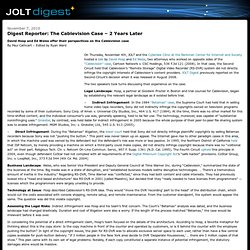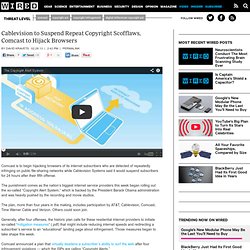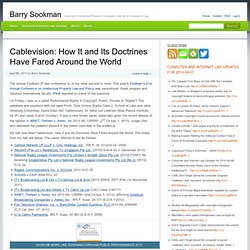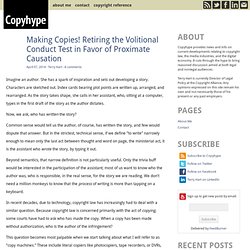

JOLT Digest » Digest Reporter: The Cablevision Case – 2 Years Later. David Hosp and Ed Weiss offer their perspectives on the Cablevision case By Paul Cathcart – Edited by Ryan Ward On Thursday, November 4th, JOLT and the Cyberlaw Clinic at the Berkman Center for Internet and Society hosted a talk by David Hosp and Ed Weiss, two attorneys who worked on opposite sides of the “Cablevision” case, Cartoon Network v.

CSC Holdings, 536 F.3d 121 (2008). In that case, the Second Circuit held that Cablevision’s “Remote Storage” Digital Video Recorder (RS-DVR) system did not directly infringe the copyright interests of Cablevision’s content providers. JOLT Digest previously reported on the Second Circuit’s decision when it was released in August 2008. The two speakers took turns discussing their experience on the case. Legal Landscape: Hosp, a partner at Goodwin Procter in Boston and trial counsel for Cablevision, began by establishing the relevant legal landscape as it existed before trial. Cablevision to Suspend Repeat Copyright Scofflaws, Comcast to Hijack Browsers. Comcast is to begin hijacking browsers of its internet subscribers who are detected of repeatedly infringing on public file-sharing networks while Cablevision Systems said it would suspend subscribers for 24 hours after their fifth offense.

The punishment comes as the nation’s biggest internet service providers this week began rolling out the so-called “Copyright Alert System,” which is backed by the President Barack Obama administration and was heavily pushed by the recording and movie studios. The plan, more than four years in the making, includes participation by AT&T, Cablevision, Comcast, Time Warner Cable and Verizon. Others could soon join. Generally, after four offenses, the historic plan calls for these residential internet providers to initiate so-called “mitigation measures” (.pdf) that might include reducing internet speeds and redirecting a subscriber’s service to an “educational” landing page about infringement.
Those measures began to take shape this week. Cablevision gets its way. Via Miri Frankel (Beanstalk) comes this link to Cable News Network v CSC Holdings Inc., 08-448, where the Supreme Court refused to block a new digital video recording (DVR) system that could make it even easier for viewers to bypass commercials.

The system in question is Cablevision Systems' remote-storage DVR system. The film industry objected that this system would infringe US copyright laws. The idea behind the technology is simple. Using remote storage, TV shows are kept on the cable operator's servers rather than in a machine inside the customer's home. This distinction is important, the article explains, because a remote system essentially transforms every domestic digital set-top box into a DVR, allowing customers to sign up instantly, without the need to pick up a DVR from the nearest cable office or wait for a technician to visit. Cablevision scheme. Cablevision outcomes. Cablevision: How It and Its Doctrines Have Fared Around the World. The annual Fordham IP law conference is, in my view, second to none.

This year”s Fordham’s 21st Annual Conference on Intellectual Property Law and Policy was sensational. Great program and fabulous international faculty. IPkat reported on some of the sessions.
Amicus brief CDT et al. 2nd circuit opinion. How Cablevision made a mess of the public performance right. Appeals Court Reverses "Remote DVR" Decision. 20070608cdt-cablevision. Cloud Computing Threatened in Aereo Supreme Court Case. Making Copies! Retiring the Volitional Conduct Test in Favor of Proximate Causation. Imagine an author.

She has a spark of inspiration and sets out developing a story. Characters are sketched out. Index cards bearing plot points are written up, arranged, and rearranged. As the story takes shape, she calls in her assistant, who, sitting at a computer, types in the first draft of the story as the author dictates. Now, we ask, who has written the story? Common sense would tell us the author, of course, has written the story, and few would dispute that answer. Beyond semantics, that narrow definition is not particularly useful. In recent decades, due to technology, copyright law has increasingly had to deal with a similar question.
This question becomes most palpable when we start talking about what I will refer to as “copy machines.” Aereo The Supreme Court is set to hear oral arguments in American Broadcasting Companies v. This argument is unsound for at least two reasons. Copying, causation, and volition in the courts Make-A-Tape Sony Betamax Kinko’s Frena Netcom. Cartoon Network LP, LLLP v. CSC Holdings, Inc., 536 F. 3d 121 - Court of Appeals, 2nd Circuit 2008.